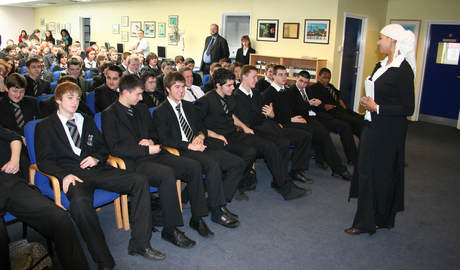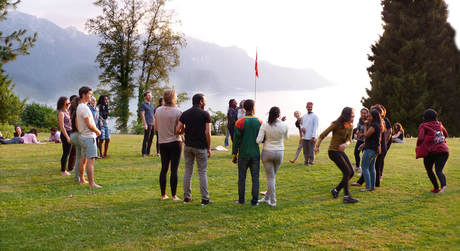After teaching mathematics in a UK state school for fourteen years, I launched a programme (The IofC Schools Service), mostly with young international teams, going to senior high schools to stimulate thought on purpose in life and motivation. In sixteen years, we facilitated about 800 sessions, often with about 100 senior students for an hour, in schools all over the UK. A resume of this can be found on the FANW website.
We were aware that the young people we were interacting with were very diverse, in all ways. For many, religious beliefs were not something they related to, or rather were put off by. Yet there was a clear identification with the deep human experiences that were being shared. It has set me on a path to pondering our shared humanity and the spiritual, in contrast to the religious, dimension. Also, to exploring why we believe what we believe. This blog carries forward some of this searching.
The perspective of Confucius “Real knowledge is to know the extent of one's ignorance”, resonates with me. Maybe, this is a perspective that the wider human family also needs to take on board, and one which IofC can helpfully contribute towards.
Over recent years, the IofC International's Trustbuilding program has made a big impact, in twelve, soon to be more, countries. How can this spirit be further fostered between people whose cultures and beliefs vary greatly?
It is striking how intelligent human beings can become totally convinced about often conflicting beliefs, particularly religious ones. Hundreds of millions of Christians see Jesus as the unique son of God. A similar number of Muslims, believe the Quran was verbally revealed by God to Muhammad through the angel Gabriel. Countless others, particularly in the East, are assured about reincarnation. Seemingly clever people also have many other diverse beliefs.
All of us are seeking to access something which is surely way beyond our human comprehension. The use of myth is helpful in reaching out with our hearts and minds. But I suspect that much confusion has come about when people or groups literalise myths. Surely, nobody really thinks of God as a rock. Yet, there is a tendency to take other Divine myths such as ‘Father creator’ more literally.
At the beginning of the Genesis story we have the line ‘God created Man in his own image, in the image of God he created them, male and female’. A friend wrote recently, “I have often thought of how much the reversal is true - man created God in man's own image. We project onto God an awful lot that is really our stuff. The question that I find most interesting is how much do I know/can I know the God that is not a human projection, but is genuinely ‘other’.”
As our lives develop, each of us accumulates all sorts of beliefs and biases, some conscious, but mostly unconscious. Have these led to believing that “our” group, lifestyles and values are normal, and the world would be a better place if others believed, lived and behaved as we do? Or has this realization led to our living more into each other’s narratives, and to valuing humanity’s diversity as well as commonality? Happily, the IofC family largely encompasses the latter. It is a key part of its attractiveness and strength.
More broadly, in recent times, humanity’s frame of reference is enhanced by the fact that we live in an increasingly interconnected world. As many people travel to, and live in lands which are way beyond their places of birth, our cultures intermix. The internet also enables us to reach into and absorb the life experiences of people in distant lands, often instantly. This gives us a much-enhanced perspective on the diversity of ways in which our world views and spiritual beliefs have taken root.
As well as how all this affects us personally, our choices can also have a huge impact when projected onto social and international events. When people or groups believe that they are on God-inspired tracks, at times there have been really fruitful outcomes of standing for justice and for caring. Some years ago, I visited Martin Luther King’s home in the USA, in Montgomery, Alabama, with an IofC ‘Action USA’ group. On the wall above the desk in his office was a large picture of Gandhi. I was struck by Gandhi, a devout Hindu, being inspired by Jesus’ life, particularly the Sermon on the Mount; and King, a Christian, being inspired by Gandhi, a Hindu. The lives and beliefs of both have, subsequently, influenced many others.
However, religiously related beliefs have also led to disastrous consequences, especially when intermingled with political purposes. In present times, American policy regarding Israel/Palestine is partly impacted by a theological belief within certain segments of evangelicalism about ‘God’s chosen people’ and that the establishment of the modern state of Israel was the fulfilment of biblical prophecy. Other recent examples include the actions of the Taliban in Afghanistan, the echoing of the Kremlin’s rhetoric by the Russian Orthodox Church in justifying the war in Ukraine, or the Dutch Reformed church giving biblical advocacy for the South African apartheid policy.
To foster the spirit of our shared humanity we will need to question and challenge mores in our society, but also those which have taken root in ourselves. For instance, in past decades, I had taken on board certain homophobic attitudes and norms. My perspective has radically changed since then, largely through living into the reality of valued gay and trans friends.
Some years ago, my wife and I journeyed to Israel/Palestine with a church group. This included a visit to the Garden of Gethsemane. We lived into Jesus’ inner struggle. I was struck by a plaque which said ‘My Father, I do not understand you, but I trust you.’ It was not clear where that quote came from. But it made me think. What leads to our beliefs?
“I do not understand you.” Was this true of Jesus too, or did he have uniquely Divine insight? One of our daughters, when aged seven asked me, “Daddy, did Jesus think the earth was flat?” We were chatting about the bravery of some earlier explorers who, despite thinking the earth was flat and they might fall off the edge, sailed off into the unknown. A very good question. Did Jesus understand Quantum Mechanics and other such scientific complexities? And if so when did this understanding come to him?
Beliefs clearly have far reaching consequences. A book by former Chief Rabbi Jonathan Sacks is titled, ‘The Dignity of Difference’. For the sake of students in our present-day schools and for future generations, let us open our hearts and minds to valuing diversity more greatly - and to deeply fostering a narrative that our shared humanity overrides all our human projections.



